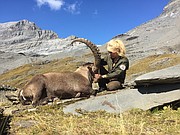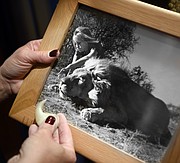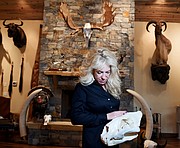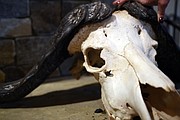Huntress aims to educate people about the sport she loves
Olivia Nalos Opre has been called the Blood Thirsty Beauty Queen — and a lot worse.
When the Whitefish mother of four defended the legal killing of beloved lion Cecil in Zimbabwe by a Minnesota dentist two years ago, she created quite a stir with her opinion piece in USA Today titled “Why We Hunt, Even Lions.”
In the aftermath of her high-profile support of the controversial hunt, she received 1,000 hate emails in just one hour.
“I heard the other day the bounty on my head is up to $200,000,” she said.
Opre takes the hate in stride because she sees the bigger picture.
“It has launched me into a place where I can advocate for hunting,” she said, sipping a cup of tea in a living room filled with wild-game trophies. “Hunters have got to talk more, or face losing” their voice to anti-hunting advocates.
“If nobody talks, then anti-hunting dominates the message,” she said.
Opre knows she’s a lightning rod in the volatile debate between the anti- and pro-hunting camps. That’s why she uses every media opportunity to educate the public about the important role hunters play as stewards of nature.
She wasn’t happy with President Trump’s recent decision to postpone the lifting of a ban on the import of trophy elephants legally hunted in Zimbabwe and Zambia. On her Facebook page, she groused about the decision, saying she’s “infuriated with ignorant media reporting their emotionally charged agenda instead of being true journalists who report ALL FACTS about the import of elephants.”
She encouraged her followers to send in a pre-written letter by Safari Club International, asking Secretary of the Interior Ryan Zinke to lift the suspension.
In that form letter is the crux of Opre’s message: “Hunting plays an integral role in wildlife conservation around the world and when hunting rights are restricted or import bans put in place, Africa’s wildlife and local African communities all suffer.”
Killing African lions is an emotionally charged issue, Opre agrees, but she said most anti-hunting advocates once again miss the bigger picture.
“If lion [populations] are not controlled, the natives have to contend with them and they’ll poison [them]. That’s the alternative,” she said. Hunting “means jobs, meat and money coming in. They see a value on wildlife … if there’s no benefit, they want it gone.”
Opre, who has killed three lions during her hunting career, insists that education is paramount in protecting not only the sport she loves but also the wildlife.
“People can’t differentiate from hunter and poachers,” she said. “I abhor poaching.”
Opre uses the example of Kenya and Tanzania’s hunting laws to make her point. Kenya closed all hunting in 1977 and banned outfitters, which typically set up anti-poaching teams. As a result, poaching became rampant in Kenya.
“They’ve lost 70 percent of their wildlife in Kenya,” she said. “In 2000 the lion population was 15,000. By 2006 it was 2,000. It’s so important to keep outfitters in place.
“Tanzania has an abundance [of wild animals] because outfitters can protect the animals with anti-poaching teams,” she said.
Responsible outfitters help protect and preserve wildlife, she added.
Opre, 40, found her voice as a proponent of hunting in 2003 when she won the Mrs. Nebraska title on a pro-hunting platform.
“It propelled me into that audience to speak on behalf of hunters,” she said.
Opre makes her living from hunting is a big way.
She’s a full-time international hunting, fishing and adventure consultant for World of Hunting Adventure.
“That’s my bread and butter,” she said.
Opre and her husband Tom co-host the “Eye of the Hunter” television show. They’re also co-owners of the trademarked Extreme Huntress challenge; Opre is a judge for the competition.
She’s also an active measurer for Boone & Crocket, Pope & Young, Rowland Ward and a master measurer instructor for Safari Club International.
Opre also spends a fair amount of time simply hunting. As she puts it, she’s more “stalk than talk.” She hunts big game around the world and has killed more than 100 species, from Cape buffalo and red stag to ibex and wild boars.
Like many hunters, Opre’s love of the sport was honed by hunting experiences as a teenager, first with her stepfather, who took her to buy her first shotgun. Later, her biological father saw hunting as a way to reconnect with his daughter. He took her on her first international hunt to Zimbabwe in 1998 when she was 21. On that inaugural hunting trip she and her father successfully hunted about 15 different species. She readily defends the time-honored practice of preserving the hunting trophies.
“For me this is a living memory of a moment of perseverance,” she said. “It’s a quest.”
She has been on 38 safaris and has hunted on six continents.
Opre was born in Seattle but grew up in Bakersfield, California. She loved hunting from the get-go.
“In the field you test yourself,” she said. “It’s the connection you have with the people you hunt with, the wind on your face, seeing the sunrise … [hunting] is the most basic, primal core of who we are. There’s an enormous amount of pride in the art of pursuit.”
Opre is proud of her 10-year-old stepson who just shot his first deer. Her older stepdaughters, ages 12 and 13, already have successfully hunted deer and wild turkeys. And there’s little doubt her 3-year-old daughter also will grow up to be a hunter.
“This is what we eat,” she said. “It’s the circle of life, and the respect of life.”
Features editor Lynnette Hintze may be reached at 758-4421 or lhintze@dailyinterlake.com.










